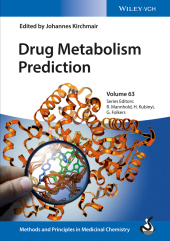 Neuerscheinungen 2014Stand: 2020-02-01 |
Schnellsuche
ISBN/Stichwort/Autor
|
Herderstraße 10
10625 Berlin
Tel.: 030 315 714 16
Fax 030 315 714 14
info@buchspektrum.de |

Gerd Folkers, Johannes Kirchmair, Hugo Kubinyi, Raimund Mannhold
(Beteiligte)
Drug Metabolism Prediction
Herausgegeben von Kirchmair, Johannes; Mannhold, Raimund; Kubinyi, Hugo; Folkers, Gerd
1. Auflage. 2014. 536 S. 150 SW-Abb., 20 Farbabb. 240 mm
Verlag/Jahr: WILEY-VCH 2014
ISBN: 3-527-33566-8 (3527335668)
Neue ISBN: 978-3-527-33566-4 (9783527335664)
Preis und Lieferzeit: Bitte klicken
The first professional reference on this highly relevant topic, for drug developers, pharmacologists and toxicologists.
The authors provide more than a systematic overview of computational tools and knowledge bases for drug metabolism research and their underlying principles. They aim to convey their expert knowledge distilled from many years of experience in the field. In addition to the fundamentals, computational approaches and their applications, this volume provides expert accounts of the latest experimental methods for investigating drug metabolism in four dedicated chapters. The authors discuss the most important caveats and common errors to consider when working with experimental data.
Collating the knowledge gained over the past decade, this practice-oriented guide presents methods not only used in drug development, but also in the development and toxicological assessment of cosmetics, functional foods, agrochemicals, and additives for consumer goods, making it an invaluable reference in a variety of disciplines.
PART I: INTRODUCTION
Metabolism in Drug Development
PART II: SOFTWARE, WEB SERVERS AND DATA RESOURCES TO STUDY METABOLISM
Software for Metabolism Prediction
Online Databases and Web Servers for Drug Metabolism Research
PART III: COMPUTATIONAL APPROACHES TO STUDY CYTOCHROME P450 ENZYMES
Structure and Dynamics of Human Drug-Metabolizing Cytochrome P450 Enzymes
Cytochrome P450 Substrate Recognition and Binding
QM/MM Studies of Structure and Reactivity of Cytochrome P450 Enzymes: Methodology and Selected Applications
Computational Free Energy Methods for Ascertaining Ligand Interaction with Metabolizing Enzymes
Experimental Approaches to Analysis of Reactions of Cytochrome P450 Enzymes
PART IV: COMPUTATIONAL APPROACHES TO STUDY SITES AND PRODUCTS OF METABOLISM
Molecular Interaction Fields for Predicting the Sites and Products of Metabolism
Structure-Based Methods for Predicting the Sites and Products of Metabolism
Reactivity-Based Approaches and Machine Learning Methods for Predicting the Sites of Cytochrome P450-Mediated Metabolism
Knowledge-Based Approaches for Predicting the Sites and Products of Metabolism
PART V: COMPUTATIONAL APPROACHES TO STUDY ENZYME INHIBITION AND INDUCTION
Quantitative Structure-Activity Relationship (QSAR) Methods for the Prediction of Substrates, Inhibitors and Inducers of Metabolic Enzymes
Pharmacophore-Based Methods for Predicting the Inhibition and Induction of Metabolic Enzymes
Prediction of Phosphoglycoprotein (P-gp)-Mediated Disposition in Early Drug Discovery
Predicting Toxic Effects of Metabolites
PART VI: EXPERIMENTAL APPROACHES TO STUDY METABOLISM
In vitro Models for Metabolism: Applicability for Research on Food Bioactives
In vitro Approaches to Study Drug-Drug Interactions
Metabolite Detection and Profiling
Index
Johannes Kirchmair is currently a lead researcher at the Institute of Pharmaceutical Sciences at ETH Zurich, Switzerland. He received his PhD in Medicinal Chemistry from the University of Innsbruck, Austria, and subsequently worked as an application scientist for Inte:Ligand in Vienna, Austria, before returning to his Alma Mater as an Assistant Professor. In 2009 he joined BASF SE Ludwigshafen, Germany, where he was responsible for the computational optimization of fungicide leads. From 2010 to 2013 he worked as a senior research associate at the Unilever Centre for Molecular Sciences Informatics, University of Cambridge (UK), where he developed computational methods for drug metabolism prediction. His main research interests include molecular informatics, bioinformatics, medicinal chemistry, and drug design.


